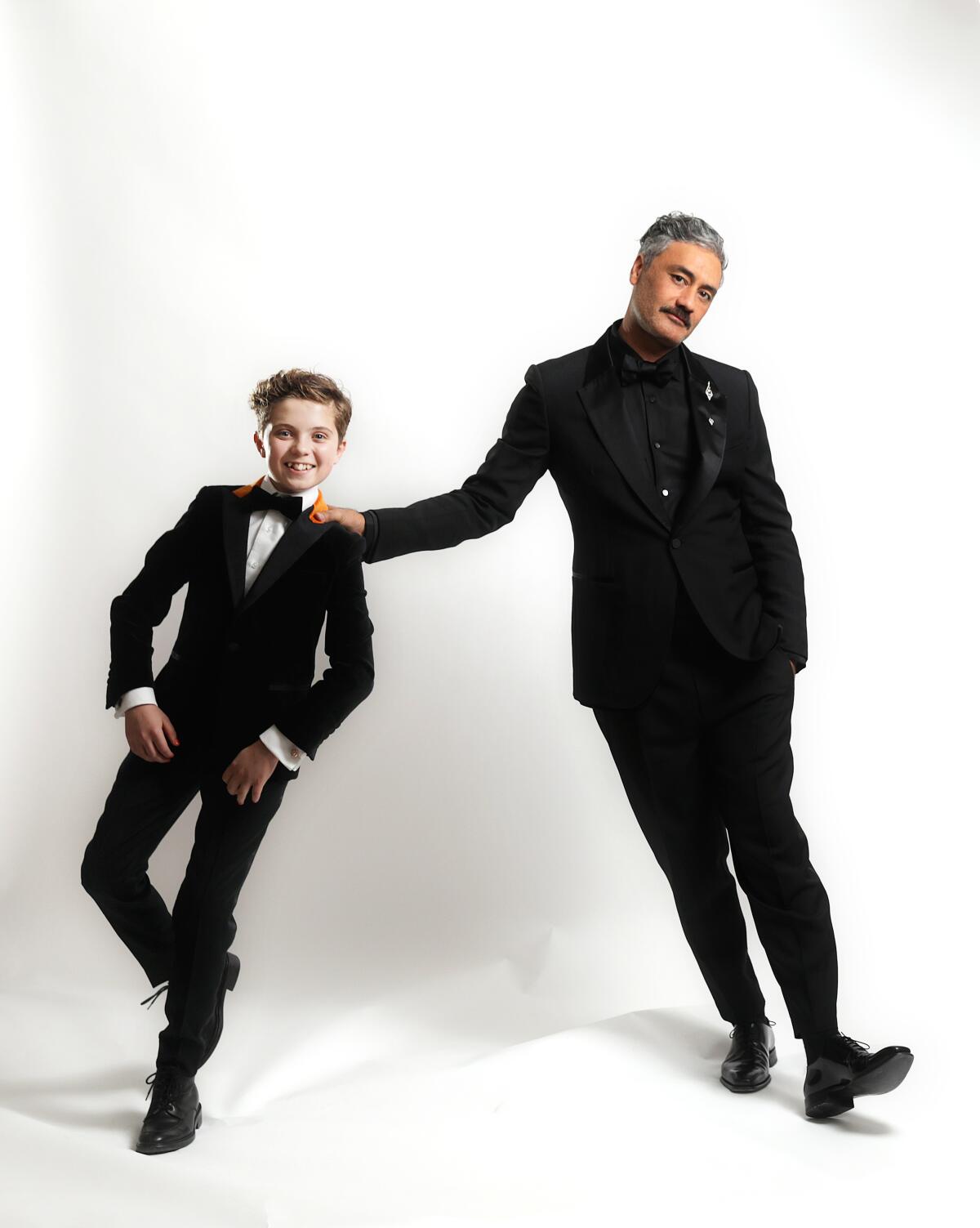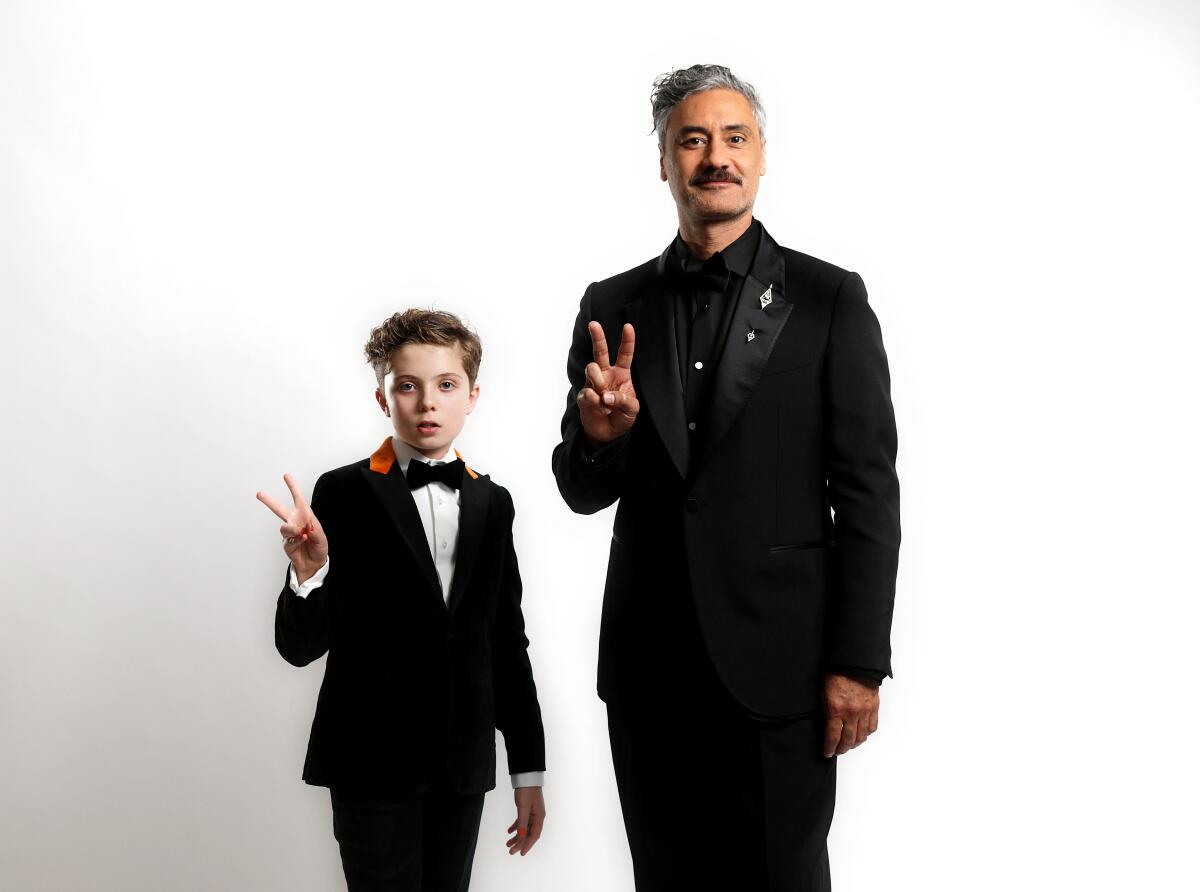From controversial to awards darling, down the rabbit hole with ‘Jojo’

- Share via
It has been a long march for “Jojo Rabbit.”
Since it won the Toronto International Film Festival’s People’s Choice Award in September, its makers have been hopping along the awards-season trail. Writer-director-actor-producer Taika Waititi has had award-winning films in his native New Zealand and ridden the Marvel train for his “Thor: Ragnarok”; but for young lead Roman Griffin Davis, this is his first go-round on the awards circuit.
Waititi says, “I think Roman’s done incredibly, with the amount of energy you have to have, and he’s been flying back and forth a lot.
“One night, I can’t remember where we were, you were talking about how shallow it all is,” he says to Davis, who made his film debut in “Jojo” and turns 13 a month after the Oscars. “Once in a while, you have a real conversation and you talk about ideas [in interviews], but those little three-minute ones you have to do again and again and again, you lose your mind. You don’t know what you’re talking about at the end.”
Davis boasts, “I’ve learned to not swear on live … I’ve learned to control my inner swearer.” Without looking up from her phone, his mother nods in confirmation from the corner of this Four Seasons suite. “I’ve learned what to say and what not to say. I used to just shout out whatever came to mind.”
It seems a long time ago that “Jojo” was controversial, people who hadn’t even seen it were outraged at the notion of a comedy about a Hitler Youth member whose imaginary friend was Adolf Hitler himself. Critics had mixed responses, with The Times’ Kenneth Turan saying: “Erratic but engaging, going in and out of daring, the film’s mixture of black humor and unashamed sentimentality is not always as good as its best parts.”
Now, with six BAFTA and six Oscar nominations (including best picture) — and full-throated endorsement from organizations such as USC Shoah Foundation — there’s light at the end of the rabbit hole.
Critics’ Choice Award winner Davis has changed since the beginning of “Jojo’s” promotional cycle. He was always gregarious and game to answer questions, but now he’s more confident and assertive. He still looks like a mini rock star with his shock of blond curls and Bowie T-shirt. He happily notes “Jojo” is the fifth-highest-grossing film in his area of England: “It’s probably because of my family and friends!”
Waititi asks, ”Have you got taller?”
“My hair’s gotten puffier. I don’t show my hairline so you don’t know where my head finishes. That’s the tip,” Davis deadpans.
Taika Waititi is soft-spoken and polite as he closes the blinds in this Four Seasons suite, takes off his shoes to reveal brightly colored socks and stretches out on his side along the couch.
Waititi cops to exhaustion but insists he’s still excited: “I’ve really enjoyed all of it. And when the nominations came out, of course, all that love is amazing. And meeting people the film resonates with on a very personal level; something they’ve been through or their parents or someone, related to the story.
“At the WGA screening, this one woman came out and said, ‘Hey, I need to talk to you. My parents were at Auschwitz …’ I thought, ‘Here it comes.’ I’d been waiting for someone to say, ‘How dare you …’ And she said, ‘They would have loved this movie. This humor was right up their alley and this is exactly the kind of way they would talk about it.’”
Waititi refers to that kind of response as “gallows humor,” but maybe it’s something more. What lingers from the horrors of the past is the trauma. But perhaps if we can laugh at them, we can destroy them.
“Comedy is such a great tool for combating bullying and dictatorships and ridiculous ideas and rules,” he says.
In the film, Jojo Betzler (Davis) is a zealous Nazi, until he discovers a young woman (Thomasin McKenzie) hidden away at the back of a closet in the apartment he shares with his mother (Scarlett Johansson). His father is off to points unknown and his mother is away a lot, leaving Jojo to spend time with the “monster” Jew and to inevitably realize she is simply a person like him.
The Shoah Foundation agrees the film could have healing powers; it launched an educational initiative in December pairing content from the movie with survivors’ testimony. The foundation’s announcement said, in part, “‘Jojo Rabbit’ demonstrates how individuals can overcome ingrained prejudices and hate.”

In “Jojo Rabbit,” director Taika Waititi brings to life a World War II satire that follows a lonely German boy whose world view is turned upside down when he discovers his single mother is hiding a young Jewish girl in their attic.
Waititi’s work can be absurd (“What We Do in the Shadows” is a vampire mockumentary in which the lords of the night turn out to be schmoes) or irreverent enough to upset some — even Waititi says “Jojo” is not for everyone. But some of those seemingly nutty ideas in the film come from grounded, if unusual, inspirations.
“When we were editing [archival footage], I thought about the impact of Hitler on the German people in the ’30s; the fervor, that mania, was similar to Beatlemania. That’s where that opening comes from,” he says of using the Beatles’ German-language version of “I Want to Hold Your Hand,” “Komm, Gib Mir Deine Hand,” in the opening credits. “I was looking at documentaries and there was footage from rallies and I’m looking at these crowds, the screaming women and the babies, and I thought, ‘Whoa. That really looks like Beatlemania.’
“Part of the documentary was about the Youth League, mass groups of girls and boys. We looked for all the footage we could of them looking happy, how swept up in the time they were.”

The ingrained picture in contemporary media is of Nazi hate rallies, book burnings, images of viciousness. Those are real, but how did it come to that?
Waititi says, “It’s all about making [people] feel good and empowered again after the Depression, taking their power back.”
Davis relates stories of classmates seeing the film and learning from it, and of a teenage girl telling him she was writing about it for a school project.
Waititi says, “That’s amazing. The film was really designed for... I wanted to make sure it was PG so that kids could see it.”
More to Read
Only good movies
Get the Indie Focus newsletter, Mark Olsen's weekly guide to the world of cinema.
You may occasionally receive promotional content from the Los Angeles Times.













